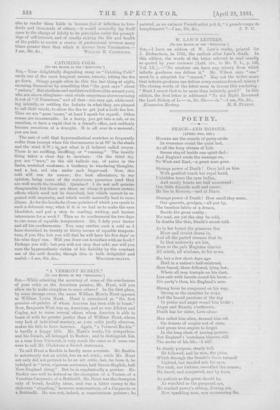"A VERMONT RUSKIN."
(ru THE EDITOR OF TUE' "SPECTATOR.')
Sta„—While admiring the accuracy of some of the conclusions of your critic on the American painter,.Mr. Hunt, will you allow me to make exception to some others P In the first place, by some strange error, the name William Morris Hunt appears as William Lewis Hunt. Hunt is introduced as " the first genuine oil-painter of whom America has been able to boast." Now, Benjamin West was an American, and so was Allston and Copley, not to name several others whom America is able to boast of with far greater justice than of William Hunt, whose very lack of individual mastery, as your critic justly observes, makes his title to fame insecure. Again, " a Vermont Ruskin" is hardly a happy title. Mr. Hunt's works, his sympathies, and his friends, all belonged to Boston ; and to distinguish him as a man from Vermont, is very much the same as if some one were to call Mr. Gladstone a Scotch statesman.
To call Hunt a Ruskin is hardly more accurate. Mr. Ruskin is notoriously not an artist, but an art critic ; while Mr. 11 ant not only did not pretend to be an art critic, but, far from it, he indulged in "terse, vigorous sentences, half Saxon-English, half New-England slang." But he is emphatically a painter. Mr. Ruskin can well be defined as the champion of a Turner, of a Venetian Carpaccio, of a Botticelli. Mr. Hunt was the champion only of broad, healthy ideas, and was a bitter enemy to the elaborate "stippling," however conscientious, of a Carpaccio or a Botticelli. He was not, indeed, a conscientious painter ; he
painted, as an eminent French artist put it, " h grands coups de temp6rament."—I am, Sir, &c., J. T. C.


































 Previous page
Previous page